#Women in Media
Text
The Vinsmoke men are misogynistic and it's so narratively important even though it's mostly subtext and never outright stated. None of them ever say anything against women specifically, and they don't seem to discriminate as far as who can be warriors, but their actions reek of it nonetheless and I can't stop thinking about it.
On the surface it seems like Sanji gives thought to treating women differently and the Vinsmokes don't, but it's clear through their actions that the only "equality" they're really upholding is that no gender is exempt from abuse and exploitation.
It's like when people say "well if you want equality, women should get drafted into the military too!" When the problem is that no one should be forced to join the military. That's basically exactly what Germa is doing.
Sanji's view of women is frequently flawed and a bit myopic, but he seeks to treat them with kindness and love and respect, whereas the Vinsmokes make no attempt at philosophy about women and just treat them horribly.
The most glaring example is probably Cosette, who they berated for making food they didn't like and then proceeded to beat unconscious solely to shatter her confidence and upset Sanji. And when Sanji is understandably enraged at their horrible abuse, they assume the reason is that he was physically attracted to her and didn't want the object of his attraction damaged (saying they didn't know he Liked her, and if the busted up face wasn't a dealbreaker they could make her Sanji's personal attendant, which also reaaally sounds like code for something else).
Another aspect is that despite having no emotions, the Vinsmoke brothers still seem to experience attraction to women. But it's not love in any sense of the word, just purely physical. They find Nami attractive, even wanting to arrange to keep her around when the Strawhats are captured by Big Mom (ew), and there's that scene of them and Judge in their private room surrounded by mostly drunken unconscious (and rather scantily dressed if I remember correctly) barmaids that were sent to them. Granted, nothing Happens in that scene, but the undertones are gross and we're only shown a small portion of the night. Whatever the case, it's clear that these women were not sent in to be equal, respectable company, but an objectified distraction to pair with alcohol, and were treated as such.
And then there are the internal family dynamics, which I think are the biggest and most important part.
To start, there's Reiju. On the surface she seems like she has the same status as her brothers, a modified Germa weapon capable of performing as her father wants. But whenever Judge talks about being proud of his children, he always emphasizes the triplets. Often he doesn't even mention Reiju, and his attention to the boys' training seems to be much closer than to hers. Her raid suit is also more sexualized, as though that's expected to be part of her arsenal. And of course, there's her name meaning "zero" while the boys are all numbered. She is the eldest, but she survives by being ignored, and it's clear that her father prefers her emotionless brothers. This feels symbolic as well since being emotional is often seen as a feminine trait, portrayed as a weakness. Judge hates weakness. And so he hates emotion, hates women.
But at the root of it all, really, is Sora. Sora who's choices and body and children were stolen from her for an abusive man's ideals about war and domination. We don't really get to know how much choice she had in her marriage, but given Judge's royal status and the fact that they obviously share zero values I think it would have to be a strategic political arrangement at best, and something she got no say in at worst.
The kids are all named in a numbering system, which also reeks of Judge not letting her into the decisions. And, of course, there is the absolutely horrific experience of being forced into prenatal surgery to genetically modify her children against her will, to the point that the only way she could exercise any agency was to poison herself in an attempt to save even one of them. She was literally just a baby-producing machine to Judge and it couldn't be more blatant.
The violent, self-centered, and misogynistic Vinsmoke brothers are born directly from a woman's choice being taken away from her. Kind, selfless, and loving Sanji is born directly from her one act of defiance, and then later saved by his sister's one act of defiance as well (after which, she was programmed to be obedient).
Basically, the Vinsmoke family is built and preserved on the abuse and exploitation of women, and Sanji is the black sheep for many reasons, but I suspect a rather large one is that he's the ultimate antithesis to that.
#one piece#black leg sanji#vinsmoke reiju#vinsmoke sora#vinsmoke judge#vinsmoke siblings#vinsmoke family#germa 66#whole cake island#wci spoilers#character analysis#one piece meta#essay#misogny#women in media
106 notes
·
View notes
Text
it isn't empowering for girls to see adultified/sexualized adolescent female characters in media, actually. get that child a pack of legos, a nintendo and a juice box you creeps.
#mine#radblr#female empowerment#women in media#girls in media#she should be climbing trees not trying on makeup cry about it#female socialization#girls#it is very important that girls be allowed to goof off in books and movies actually#especially now#they need whimsy#not whatever the fuck is happening at netflix and disney
93 notes
·
View notes
Text
The Kenough Test
A test to determine if the women in a film about men are treated as well as Ken in the Barbie movie
In order to pass this test the following criteria must be met:
There are roughly the same number of women as men in the film
The women regularly interact with each other throughout the film
They have personalities, emotions, and interiority and are presented sympathetically to the audience
None of them are villainized, even if they are functioning as antagonists
At least one woman in the film passes both the Bechdel and Mako Mori tests
227 notes
·
View notes
Text
so the times published this and honestly while reading it all i could think was….who cares? you’ve got to be pretty stupid to think that any story centering a woman is somehow about feminism. yeah it’s obviously going to illuminate common female experiences, like being overlooked and underestimated and taken advantage of, because those are things all women go through. acknowledging those realities doesn’t make someone a feminist lmaooo
and honestly again WHHOO CARRESSS i mean fr we have to watch so much morally ambiguous shit about men all the goddamn time. or just straight up evil. like i get that breaking bad is fiction but seriously the way people idolize walt … anyways there’s so much out there true and fiction about men and it’s never criticized for misrepresenting bad shit or glamorizing immorality it’s just accepted. so shut up
also, it was honestly fucking nice to watch a show about a woman who wasn’t a victim. she was ruthless and straight up bad. the actual griselda blanco was much worse. still, there was stuff that victimized her, like allegedly being a prostitute and pumped out by her husband but the fact that this show made it very clear that she’s a complex character who’s not just some guys wife, not just some traumatized survivor, but a woman who’d experienced and executed violence — she was a loving mother, a wife, she was a killer (she killed all of her husbands and many friends), she was a user, she was a skilled businesswoman and negotiator, she was incredibly smart and inspired shocking loyalty, she was all that and more. she was so human to me in a way. because she was clearly not a trope, which is so fucking rare to see.
anyways this show is good and anyone who thinks it’s trying to “girlboss” a murderous drug lord is seriously missing key brain functions
99 notes
·
View notes
Text
Let me talk about Women in Refrigerators
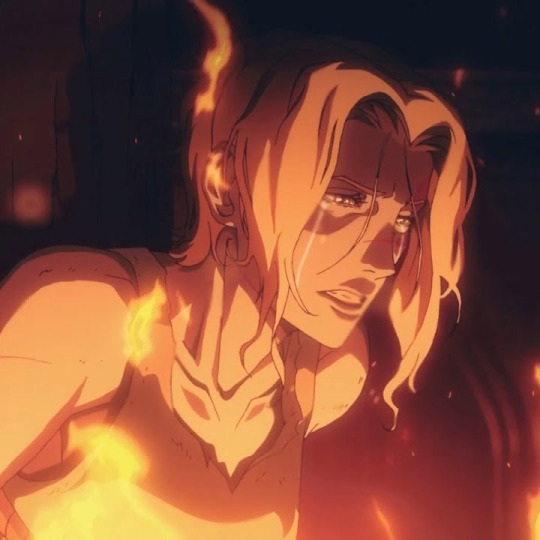
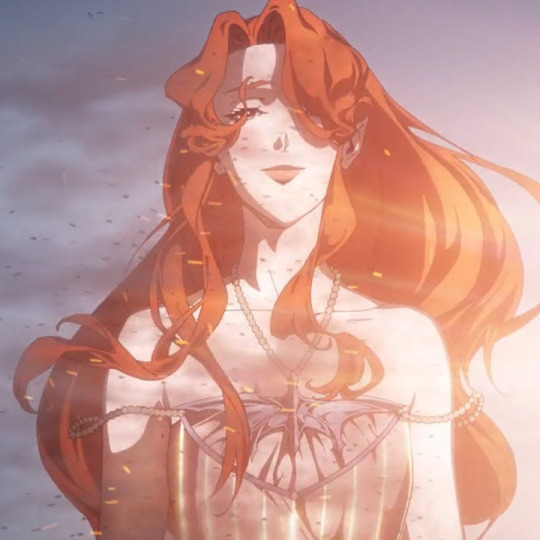
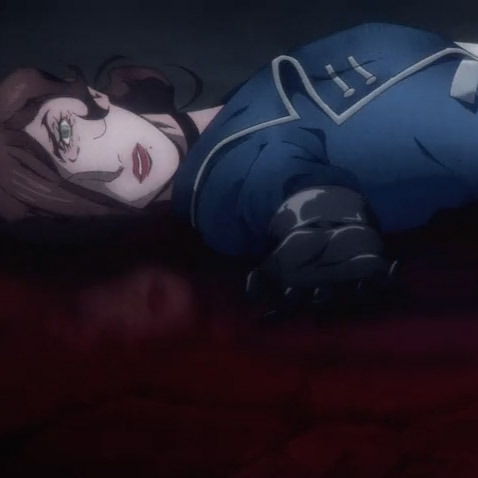
You know what? This is a thing that is kinda annoying me in the Castlevania fandom. How everyone is screaming about Women in Refrigerators, while folks so clearly do not understand what the trope actually is about and why it is a bad trope.
Like, there is not a single death of a named woman in Castlevania, that not at least someone has called "fridged". Alright, maybe Drolta. But other than that... yeah, folks definitely have called Lenore and Carmilla fridged. And... No, people, you misunderstand the trope.
The name of the trope was coined based on Green Lantern vol. 3 #54 (from the 90s), in which Green Lantern finds his death girlfriend stuffed in a refrigerator - mostly for shock value in the reader. Mind you, this was the 90s, when superhero comics were really, really edgy and stuff. And in fact the kind of story happened a lot of times during this time. Female characters being killed, raped and tortured for pure shock value, with the story not featuring any idea of what this did to the female character, but rather focusing on what this does to the male characters. (And mind you: Yes, a woman can be considered fridged and still survive the ordeal. A lot of folks do consider Barbara in The Killing Joke fridged as well.)
So, what does "Fridging" in terms of the trope mean? Basically it means that a female character suffers a horrible fate just so that another (most probably male) character can be motivated to do something and react to this thing happening, setting in motion a character arc for the surviving character - or even setting into motion the plot.
In many examples it should also be noticed that at times the female characters mostly just exist to meet their horrible end. Supernatural as a show is really bad in this regard. Like, within the first episode of the show THREE FUCKING WOMEN get fridged, just so that the brothers can travel together and start the plot.
So, let's move back to Castlevania.
Lisa is fridged. There is no way around it. Yes, it does not feel like it, because they still managed to make her a character of sorts, but yeah, she definitely is fridged. She dies a horrible death and that death is what motivates the plot, as well as what motivates both Alucard and Dracula. That is very classical fridging no way around it.
Carmilla and Lenore, though? Yeah, they are not fridged. They are characters who just die. Their death is not used to motivate another character. Their death is also not random, like most fridging deaths. Especially Carmilla is basically asking for her death, of course. She is a villain and gets the same death as all other villains. And while it is a bit different with Lenore, she definitely is not fridged either, giving that she literally dies in the last episode with no plot or development happening because of her death.
In Nocturne it gets a bit more complicated. Is Julia fridged? In a way, I would argue, she is, mostly on the value that she exists as a character to die and for her death to be the basis for Richter's character arc, giving him the trauma he needs to overcome.
Esther meanwhile does not feel fridged to me. Because Annette's trauma is not deeply linked to her death, rather than the entire slavery experience in general.
Tera? Well, for Tera it is too early to tell. I still assume that her change into a vampire is going to be used to have the characters realize, that vampires are not inherently evil, and to give us a view into what vampire society looks like. At least that is what I assume.
By the way: The fridging of female characters is my big issue with the PS2 Castlevania games. Like, in Lament of Innocence both Sara and Elisabetha are getting fridged to motivate Leon and Mathias. And the same is true for Rosalie in Curse of Darkness, who as a character only exists to motivate Hector. I mean, she is so replacable as a character, that Hector fucking replaces her by the end of the game.
#castlevania#castlevania netflix#castlevania nocturne#refrigerated women#women in refrigerators#fridging#feminism#women in media#julia belmont#castlevania lisa#castlevania tera
94 notes
·
View notes
Text
Desperately need media with gnc women in it. Looking for recommendations in any medium, genre, etc
57 notes
·
View notes
Text
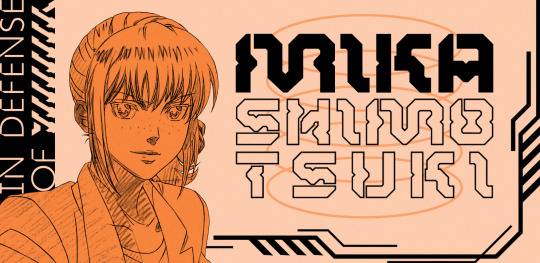
An Essay Exploring Psycho-Pass's Most Controversial Character
I know I’m opening a huge, slimy can of worms and potentially incurring the wrath of half the Psycho-Pass fandom, but I feel compelled to share my feelings on Mika Shimotsuki and how I believe she serves as a lightning rod for fan culture misogyny. Now, before I start, let me just say that this essay isn’t targeted at any one individual, and it’s just my personal opinion, which you are more than welcome to disagree with. I’d also like to stress that, despite my love for Mika’s character, I’m going to try my very best to approach this topic from an academic standpoint rather than an emotional one. I recently picked Parasocial Relationships and their effect on female celebrities and fictional characters as a thesis for my Gender and Media course, and it really got me thinking about this anime in particular, so here we go…
Let’s tackle the female side of things first, because it’s the one that shocks and disappoints me the most. Don’t get me wrong -- I think fandoms with a strong female presence are awesome, complex, uplifting, and oftentimes incredibly positive and inclusive spaces. I love being a female genre fan and interacting with other female genre fans. That said, I’ve noticed female fandom can sometimes fall prey to online bullying and misogynistic groupthink when it comes to (a) female characters they find arrogant, bossy, mean, etc. and (b) female characters who are positioned as potential love interests for their collective male "blorbos," "husbandos," "faves," whatever the term may be. These two things very often overlap, which I’ll touch on later, but for now, let’s talk about the first point.
There was a big movement online several years ago urging creators to “let women be mean. Let them be angry. Let them be petty and complex and difficult. Let them be messy.” I fully support this idea in both theory and practice and wish it were that simple, but unfortunately, it’s not, because uncomfortably large swaths of fandom don’t like/appreciate unapologetically mean female characters the way they do male characters. Men in fiction are allowed to be cutthroat, selfish, cruel, narcissistic, arrogant, and even evil without garnering even a fraction of the judgement that female characters receive for simply being “difficult” or “unlikable.”
Take, for instance, Shougo Makishima. The Psycho-Pass fandom at large adores this character (myself included), despite the fact that he’s a remorseless sociopath who touts the importance of free will as a wholesale excuse for murder. He is a bad person, full-stop, and yet he garners love -- even sympathy -- in abundance. He’s the subject of fawning fan fiction, chibi art, thirst tweets, and endless Reddit analysis. Fans are capable of seeing him, murderous warts and all, as a product of the warped dystopian society Sibyl has created. But Mika? Nope. Just “a bitch, a whiner, an arrogant little girl who deserves to get slapped in the mouth.” (I am not making this up. These are the type of comments I see *female* fans making left and right about her character). She receives far more hate for giving up the location of Akane’s grandmother as a blackmailed, frightened teenager than Makishima does for slashing Yuki’s throat or blowing up Masaoka. Hell, she catches more heat for Akane’s grandmother than Sakuya Togane, the woman’s actual murderer and -- I can’t stress this enough -- a 41-year-old adult man.
Now, I know what some of you are thinking -- Makishima and Togane are villains, so their personality flaws (putting it lightly) and horrible actions are essential to the narrative and indicative of good storytelling. We’re meant to “love to hate them.” All correct, and yet this doesn’t change or excuse the fact that their standing in the fandom, when compared to the equally complex and emotionally fractured Mika, is textbook pernicious misogyny. But, for the sake of argument, let’s compare Mika to another character ostensibly on the side of good -- Nobuchika Ginoza. [Note: Ginoza is my favorite character in Psycho-Pass, and any commentary regarding his PP1 shittiness is made with pure love and appreciation for him and nuanced character growth in general.]
When we first meet Ginoza, he is rude, terse, unyielding, intellectually smug, and totally unforgiving of those closest to him. He’s a brilliant character, and his behavior, no matter how insufferable and seemingly cruel, is the result of compounded trauma -- the trauma of having his father ripped away when he was only nine, the trauma of being unfairly judged for the “sins” of said latent criminal father, the trauma of his mother numbing her pain with medication and eventually becoming something akin to a human corpse, the trauma of finding a new support system and best friend in Kougami only to once again be “abandoned” for the other side of the law. In many ways, he’s still a hurt child lashing out at the world, unwilling to see it for the complicated, morally gray place that it is, because being mad is easier. Telling himself that Enforcers are nothing more than dogs for him to guide and use as shields is easier. Blindly trusting the judgements handed down by Sibyl is easier.
In this way, he and Mika are remarkably similar. When she first joins the MWPSB, she’s a 17-year-old minor whose best friend (and probably first love) was dismembered by a latent criminal under the direction of a serial killer disguising himself as a teacher -- a trusted authority figure. She’s filled with guilt and self-loathing over her failure to act, and the easiest way for her to sort out her feelings and ensure the same thing doesn’t happen again is to harden herself to all latent criminals. Distrusting them, treating them as “other,” is her form of self-preservation. Yes, it makes her come across as mean, as closed-minded, as unlikable, but that’s not a bad thing. It’s good storytelling, and it presents her with plenty of potential for growth, which she is certainly given.
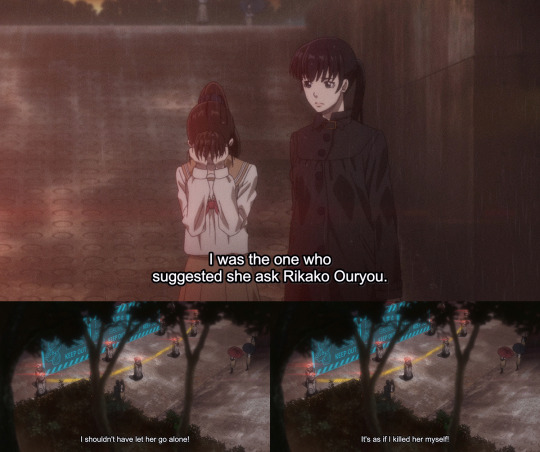
[Upon discovering that her best friend, fellow Oso Academy student Kagami Kawarazaki, has been murdered by Rikako Oryo, Mika breaks down in tears, blaming herself for the tragedy. This is the moment her distrust of latent criminals is solidified.]
But, unlike Ginoza (a 28-year-old adult man), over half the fandom decided that Mika was so awful, so totally unforgivable, such a “heinous cunt,” that they were unwilling to allow her the time and space to grow beyond her trauma and immaturity. But why? Is it because we’ve been taught to judge women, even fictional ones, based on a different set of criteria than men? I think the answer is obvious, and I urge fans who dislike Mika’s character with such intensity to seriously examine their reasoning. I don’t mean to say that she’s infallible (hardly) or that it’s wrong to dislike her. Everyone is entitled to their opinion, and no one person’s take is more valid than another’s, but it’s definitely something to think about in the larger conversation that is media analysis.
Which brings me to Akane Tsunemori, someone who fits all the abovementioned criteria for a “likeable” female character. [Another note: I love Akane, and none of this is meant to disparage her. I am simply trying to point out that she’s a more easily digestible female when viewed through the patriarchal lens of pop culture.] She’s smart but not arrogant about it, strong-willed but never disagreeable, empathetic but not easily led by her emotions, and most importantly, she’s always kind to the fandom’s male faves. She is, in almost every way, trademark "Best Girl" material, and Mika is her foil (at least in PP2). She’s set up to be the anti-Akane, both in personality and narrative function. If Akane trusts someone, Mika doesn’t. If Akane wants to bend the rules, Mika is rigid in upholding them. If Akane isn’t afraid of clouding her Hue, Mika is downright terrified.
Though it’s never stated outright, she probably hoped her senior Inspector would serve as a mentor figure, yet we see none of that from Akane, who often abandons Mika to chase down seemingly wild leads and appears to be stuck in the past, yearning for the original Division 01. (Mika even says as much to Ginoza in a novelization of the first film.) On top of that, I think it’s important to remember that we’re predisposed to side with Akane, as she is both our POV protagonist *and* the hero of the narrative. We have unprecedented access to her private moments, motivations, and methodology. We know she means well and trust that her unconventional strategy will pay off in the end. Mika does not. All she knows is that her direct superior is habitually breaking the rules, overloading her team with what feels like excessive busywork, and ignoring the more bureaucratic side of the job in favor of unconventional/unsanctioned detective work. If I’m being perfectly honest, I would also be submitting concerned reports to my boss.

[When Akane blatantly disregards Sibyl's judgement of bomber Akira Kitazawa, talking him down from a Crime Coefficient of 302 to 299, Mika confronts her for putting both their colleagues and nearby civilians in danger. This later proves to be the right call, as Kitazawa attacks Inspector Risa Aoyanagi and escapes police custody.]

[While investigating Kirito Kamui, Akane keeps her suspicions/theories close to the chest, leaving Mika and the rest of Division 01 in the dark as to her game plan.]
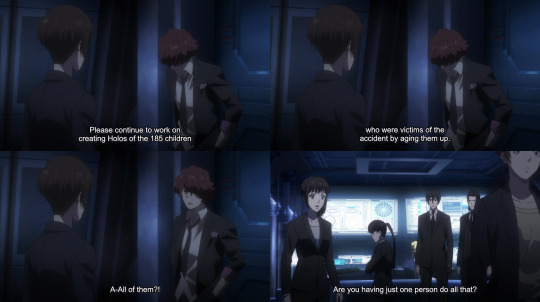
[Although Akane's decision to entrust Hinakawa with all 185 Halos proves to be the right one, it's understandable why Mika is taken aback by her placing so much responsibility on a single subordinate -- especially one with Hinakawa's history.]
Now, that’s not to say Mika’s feelings about Akane are purely altruistic. She’s definitely jealous of her senior Inspector and resents her standing within the Bureau, which makes her behave in ways both petty and vindictive. But I’d argue that this, too, is understandable, if not wholly forgivable, when viewed through Mika’s eyes. Picture this: You’re the youngest-ever recruit to a highly coveted position. You follow protocol to a T, are deferential to your superiors, and show a genuine aptitude for the job. Even your callousness toward the Enforcers (again, your childhood best friend was butchered by a latent criminal) is in accordance with Sybil’s will. Shitty, yes, but standard for someone raised within the Orwellian hellscape of 2100s Japan. And yet, everyone around you prefers your senior Inspector. Your subordinates defer to her when you’re the officer in charge (Hinakawa) and even help her game the system (Ginoza). The Chief tells you you’re boring, but displays obvious favoritism toward her. This severely harms your self-esteem and colors the way you interact with everyone around you. After all, it’s hard to feel like a valued member of the team when you’re being undermined and lectured at every turn. This doesn’t excuse Mika’s behavior, and if she didn’t evolve, I might understand some of the hate, but she does evolve. Spectacularly. She’s just not Akane, and that’s okay.
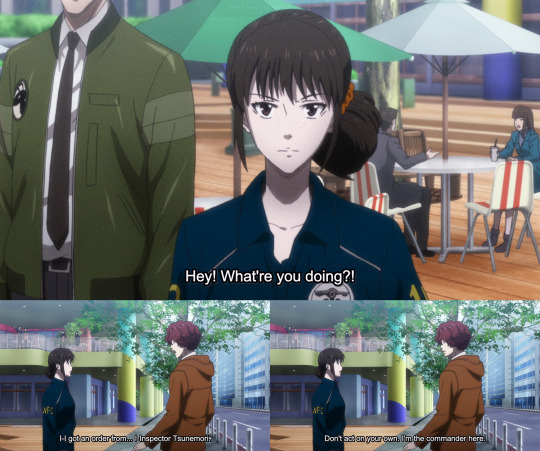
[While dealing with the hostage situation in PP2, Mika notices Hinakawa working on something off to the side. When she confronts him about it, he admits that he's acting on Akane's orders, even though Mika is technically the officer in charge.]
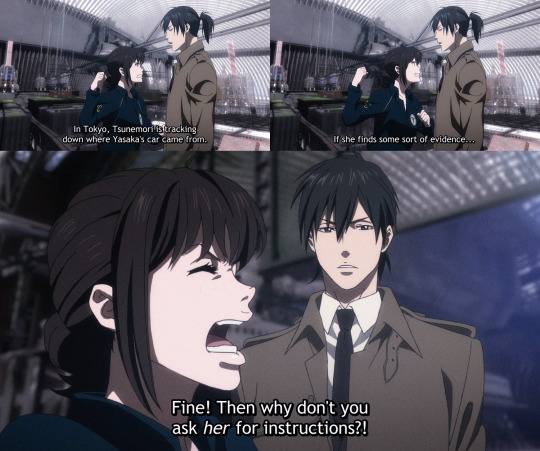
[A similar incident occurs in Sinners of the System: Case. 1, when Ginoza shoots down Mika's (admittedly ridiculous) plan, which she interprets as him once again siding with Akane over her.]
Again, this is good storytelling at work, and you can acknowledge that these two women are diametrically opposed and still appreciate -- hell, even like -- both of them for the well-written characters they are. After all, most Psycho-Pass fans like both Kougami and Ginoza in PP1 despite their many differences, not to mention the fact that Ginoza is (and I say this with love) a giant asshole. Let’s not forget, he was *this close* to microwaving Kougami at Chief Kasei’s behest. You can tell yourself he wouldn’t have, but are you sure? Are you really sure? But we forgive him, because he’s a man. Anyway, back to Akane and Mika. For reasons I’ll never understand, many fans find it borderline impossible to love two women with beef, whether it’s one-sided or mutual. There can only be one Best Girl, and everyone better be on her team. It reminds me of the Sansa vs. Daenerys discourse that gripped the Game of Thrones fandom in its last few seasons. This is doubly ridiculous in Psycho-Pass’s case, because Akane and Mika come to trust, respect, and depend on each other. But people decided to hate this 19-year-old forever, so none of that matters.
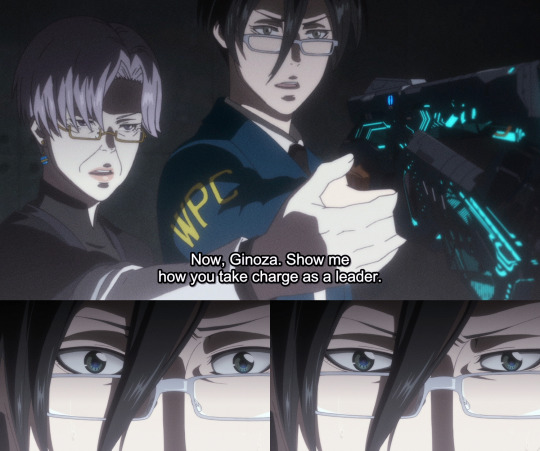
[Notice how Ginoza's gaze narrows ominously in the last frame, suggesting he might actually have pulled the trigger, thereby killing his best friend, had Akane not intervened.]
Now, let’s return to my earlier point about certain fans irrationally hating any female character they deem unworthy of their blorbo, husbando, etc. This is where Parasocial Relationships become extremely interesting. As mentioned above, Ginoza is my favorite character in Psycho-Pass, which I think is pretty common. While I myself have never been one for self-insertion or creating OCs to pair with my favorite characters, I understand that it’s a popular trend, and if you enjoy it, more power to you. It becomes problematic, however, when those who engage in self-shipping/OC-shipping decide to collectively gang up on the female character creators have paired (or hinted at pairing) with the object of their affection. Enter GinoMika. Now, I know what you’re thinking -- “But Mika’s a lesbian!” I don’t necessarily agree. Do I think she was in love with her best friend at Oso Academy? Yes. Do I think she had a crush on Yayoi at the beginning of PP2? Yes. Do I also think it’s obvious she currently has feelings for Ginoza, which have been steadily growing since Sinners of the System? Absolutely. For this reason, I interpret her as being both bisexual and demisexual. But that’s beside the point --
The point is that many Ginoza fans who ship him with themselves, their OCs, or Akane (remember, she’s Best Girl) seem to enjoy trashing on Mika like it’s an Olympic sport. And when I say “trashing,” I don’t mean your normal yet still disappointing level of ship nonsense; I mean unhinged, violent rhetoric that makes me feel like the Internet is a place where women can never win. And why? Because she was mean to him when she first started working for the MWPSB? As if he was oh-so-kind to the Enforcers who worked under him. I seem to recall him screaming at his father and threatening to “make him pay” for visiting his sick wife without permission. Oh, and then there was the time he introduced Akane to her new colleagues by telling her, “Don’t think that the guys you’re about to meet are humans like us.” But yes, Mika once told him that she didn’t want his opinion as a latent criminal, which is so much worse. And before you can say that she’s still a bitch to him, let me point out that she is a textbook tsundere. That’s how she flirts, shows affection, etc. She can never come right out and say what she means, because that would make her vulnerable. But she can surreptitiously tell Ginoza he better come back alive by insisting he return her special Dominator. You know, because it would be a real hassle if she had to replace that thing.
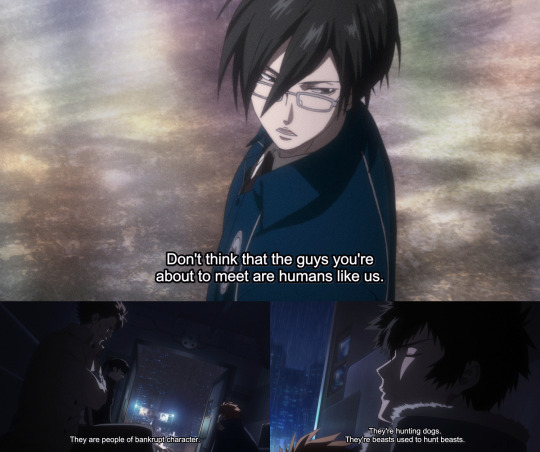
[The language Ginoza uses when introducing Akane to the Enforcers, including his own best friend and father, is deeply dehumanizing.]

[When Aoyanagi takes Masaoka to visit his estranged wife, Ginoza reacts with explosive anger, reprimanding his father in front of their colleagues and threatening to retaliate should he do it again.]
Which brings us, at long last, to the male portion of the fandom. While many female fans like to call Mika out for her more negative character traits, completely ignoring any and all growth she’s experienced since PP2, male fans tend to direct their anger, dislike, etc. in a much more aggressive manner. I wish I was exaggerating when I say that I’ve seen multiple posts praying for Mika’s rape and subsequent murder. You can’t dive into a single “Season 4 Wish List” thread without finding at least one person wishing extreme ill on Mika Shimotsuki. It's pure misogyny, classic “I’ll fuck the bitch right out of her” rhetoric, and it has no place in this fandom or any other. You would never see a male character being talked about in these terms. Consider this: There’s more fan fiction featuring Mika being raped or coerced into sex by her tormentor, Sakuya Togane, than her having a positive, consensual experience with any other character. Love her or hate her, that is extremely fucked up. We as a fandom need to do better, because once this type of misogyny can be weaponized against fictional characters, it becomes much easier to use against real people. Fan culture, though it might seem trivial, says a lot about us and our values.
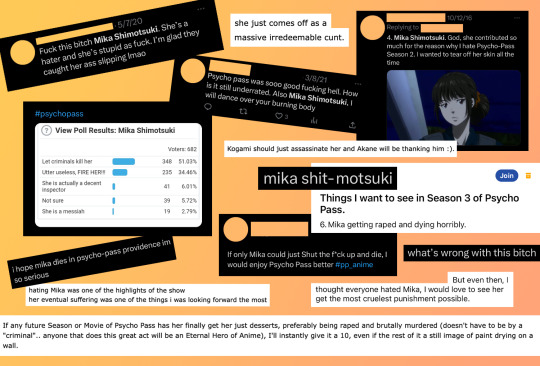
[This is just a sampling of the comments you'll find on Twitter, Tumblr, Reddit, and other social media sites.]
That said, I’d like to end this essay on a more positive note, so let’s take a look at all the ways in which Mika has become a better, more compassionate human being over the course of the series...
By PP3, she shows obvious concern for her Enforcers, values their opinions, and treats them like integral members of her team. In an especially cute scene, she even fist-bumps Tenma Todoroki after they work seamlessly to defeat Koichi Azusawa’s henchmen. She also makes a point to attend the party thrown in the Enforcers’ quarters, as she now longs to be part of the gang -- a gang she would have actively shunned in PP2.
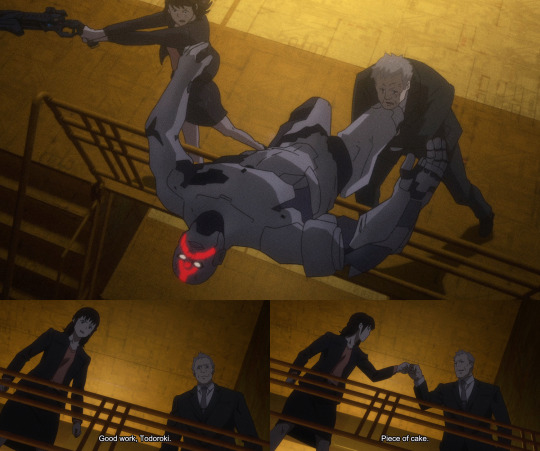
[During First Inspector, Mika shows time and again that she's willing to work with and for her Enforcers.]

[As Chief, Mika realizes that Enforcers deserve respect and gratitude from their superiors. They are no longer dogs to her.]
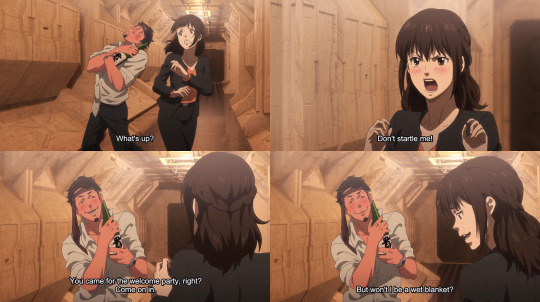
[In PP2, Mika tells Ginoza she doesn't care what the Enforcers think of her. By PP3, however, we see her display concern that her team might find her dull. She wants to be liked and accepted by them.]
She becomes far more flexible with her co-workers, allowing Inspectors Arata Shindo and Kei Mikhail Ignatov plenty of freedom to conduct investigations as they see fit. Yes, she consistently scolds them (textbook tsundere behavior), but this is done in a manner far more humorous than anything else. We know she actually trusts them and has their best interests at heart; she just can’t bring herself to say it aloud. She also repeatedly takes heat from Chief Hosorogi on their behalf and is genuinely worried for Arata when it seems like Sibyl might “eliminate” him. The palpable relief on her face when she finds out he’s allowed to remain an Inspector speaks volumes.
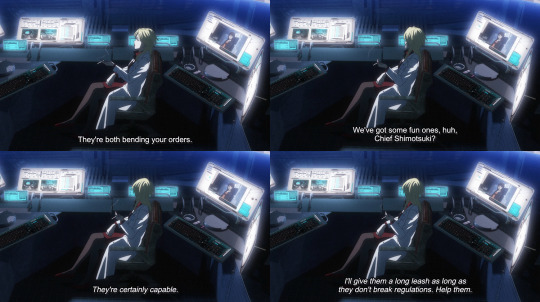
[Throughout PP3, Mika allows Kei and Arata to play to their individual strengths, even if it means bending the rules -- something she would never have done in PP2 or the first film.]
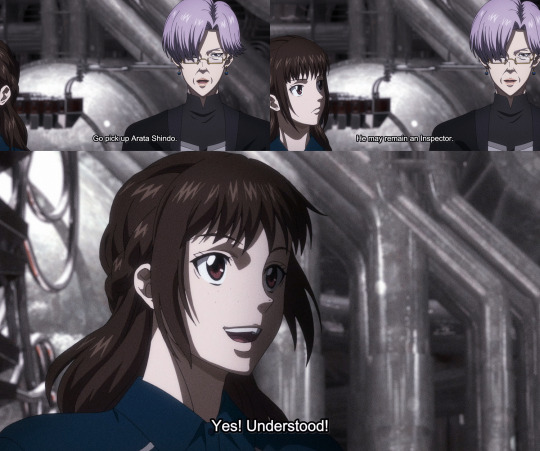
[Just look at that excited face. No caption necessary.]
She goes out of her way to make sure the immigrant prostitutes saved by religious leader Joseph Auma are protected following his death. This is an especially big deal, since many of these individuals are latent criminals, and Mika is forced to ask her newfound nemesis, Frederica Hanashiro, for a favor in order to secure their safety. When she tries to pretend it’s no big deal, Frederica calls her bluff by pointing out that no one would stoop to asking someone they hate for help in order to protect people whose fates they don’t care about.
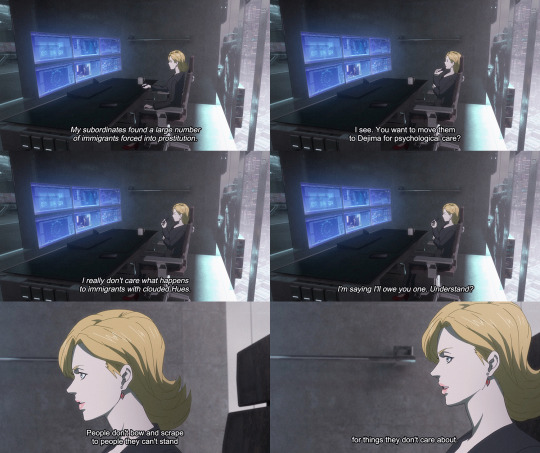
[Even though Mika detests Frederica, she puts the well-being of the immigrants before her own pride.]
In Sinners of the System: Case. 1, her distrust of latent criminals is permanently altered after dealing with Izumi Yasaka, whom she works tirelessly to rescue and comes to view as brave, capable, and worthy of reintegration into society. She also displays genuine concern for and lack of discrimination toward Takeya Kukuri, the young son of a latent criminal, and is horrified to discover that the latent criminal inmates at Sanctuary are being used as disposable tools to move nuclear waste canisters.
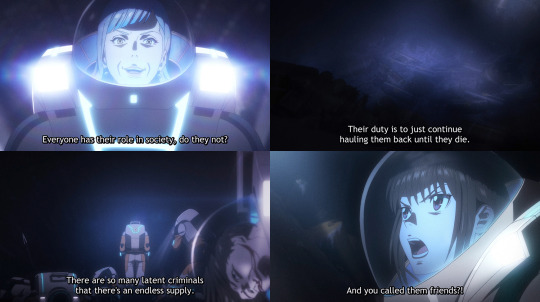
[Sinners of the System: Case. 1 marks a decided shift in the way Mika views latent criminals. Instead of lumping them all together, she begins to see them as individuals who deserve basic human rights.]
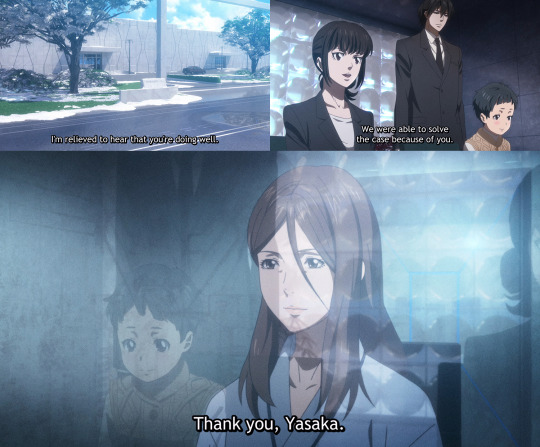
[Even though Mika is unable to save all the latent criminals at Sanctuary, she does everything in her power to ensure Yasaka and Takeya walk away clean.]
When Enforcer Mao Kisaragi turns out to be the “fox within the CID,” Mika and the rest of Division 01 are united in supporting her claim of innocence. Mika trusts (without concrete proof, mind you) that she’s telling the truth about being an unwitting accomplice, something she never would have done in PP2 or even the first film.
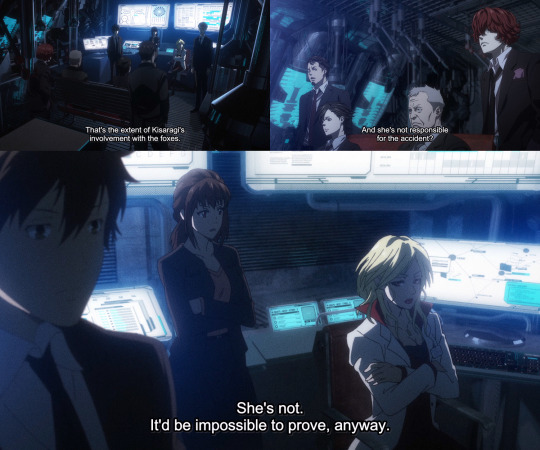
[While the old Mika would have been the first person to distrust Kisaragi, here we see her standing up for the beleaguered Enforcer.]
She comes to respect Division 01 (Akane, Ginoza, Sugo, Hinakawa, Kunizuka, and Shion), views them as a surrogate family, and misses them once their unit is disbanded. In Sinners of the System: Case. 3, Frederica Hanashiro, who temporarily worked as part of their unit, says, “CID Division 01… They’re not just capable; they have a rare teamwork that overcomes the barrier between Inspectors and Enforcers.” Yes, this is mostly due to Akane’s guiding influence, but it’s clear Frederica is talking about the whole team. It’s taken Mika years to get there, but she is now definitely part of the group, not a jealous outsider looking in. In fact, even Mika’s obvious dislike of Frederica in PP3 is a clear result of this affection. After finally finding a place to belong, she feels as though Frederica swooped in and stole her found family, leaving her right back where she started -- on the outside.
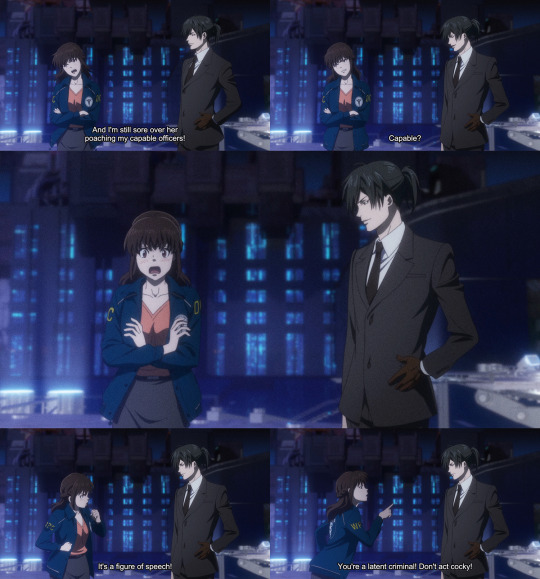
[Though she'll never admit it, Mika views Ginoza as both a mentor and a friend. When he leaves the PSB to join SAD/MOFA, she misses having him around.]
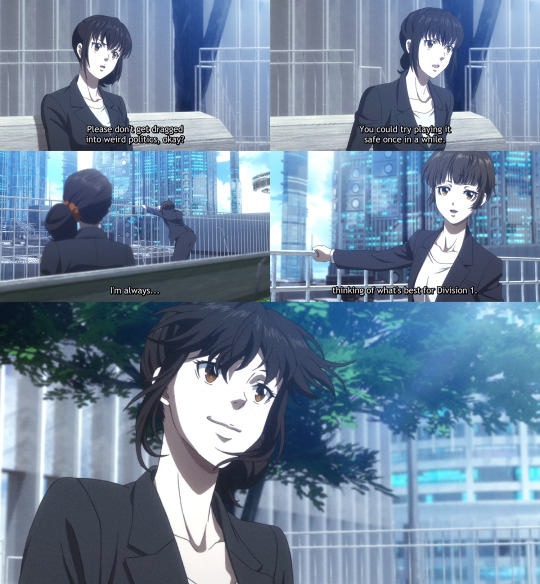
[During her lowest moment in PP2, a jealous Mika actually hopes that Akane's Hue will darken. In Sinners of the System: Case. 2, she pleads with her to take her own safety more seriously. It's clear a big change has occurred in the intervening years.]
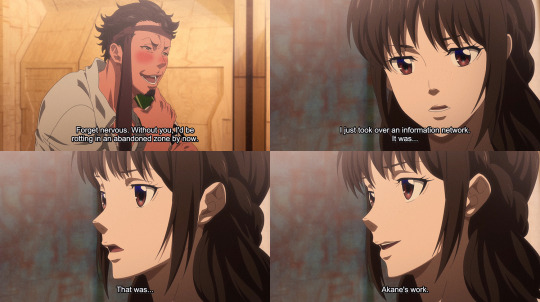
[Instead of feeling constant competition with Akane, by PP3, Mika is finally able to give her her due. It's clear they trust and respect each other despite their many differences.]
She’s grown from an immature young woman who couldn’t bring herself to take responsibility for her failures -- most notably her involvement in Akane’s grandmother’s murder -- to a responsible PSB Chief who holds herself accountable for anything that goes wrong with her Inspectors and Enforcers. This is most evident in her reaction to Koichi Azusawa taking control of Nona Tower and subsequently endangering the lives of MWPSB faculty and agents. We first see inklings of this change near the end of PP2, when Kunizuka tells Mika she’ll never forgive the person who gave up Aoi Tsunemori’s location, and Mika responds in kind. It’s clear that she’s not merely parroting a response to save her own skin but is deeply troubled and filled with regret over her own actions.

[In PP2, Mika is constantly blaming others for her mistakes. By First Inspector, she's owning mistakes she didn't even make.]

[Mika trusts her team so much, she's willing to put her job on the line.]
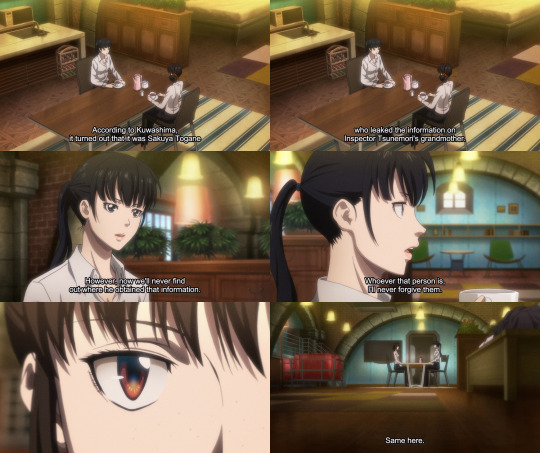
[Although Mika doesn't come clean to Kunizuka about her role in Aoi Tsunemori's death, it's clear she’s haunted by it. Later, when she confesses the truth to Ginoza, he admits to feeling a similar guilt over the way he treated his late father, telling Mika they'll have to bear their respective shame silently for the rest of their lives.]
And lastly, I believe the biggest example of Mika's growth can be found in what is arguably her most important relationship -- the one she shares with Ginoza. Whether you view them as mentor/mentee, begrudging friends, potential love interests, or all three, you can't deny that they have one of the most interesting and entertaining dynamics in the series. As mentioned above, when Mika first meets Ginoza, she views him as a cautionary tale. His demotion from Inspector to Enforcer is her worst nightmare, something that could conceivably happen to her, though she'll never admit it. Because of this, she treats him with hostility, disregarding his opinions and shunning his advice. But the longer they work together, the more we realize that Ginoza brings out the best in Mika -- and vice-versa. His calm, cool demeanor tempers her fiery spirit, and her enthusiasm makes him feel like he still has a purpose. By the time PP3 rolls around, he's become her #1 confidant, the person she calls whenever she has intel to share, grievances to air, etc. And you can't deny that Mika is the one person who makes Ginoza funny. Their flirtatious banter is genuinely charming and shows the softer, more human side of both their characters.
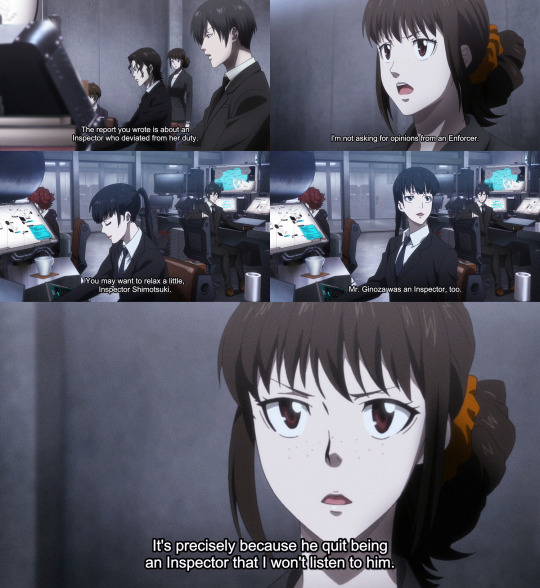
[Given her history with latent criminals, Mika refuses to listen to Ginoza, even when he's coming from a place of experience and genuinely trying to help her.]

[After working together for several years, Mika learns to value Ginoza's opinion and even feels proud when he compliments her.]

[During the Sanctuary case, Ginoza admits to both Akane and himself that being an Enforcer isn't so bad, as long as Mika is the one calling the shots. He knows she has a good heart, and working for her reminds him why he joined the MWPSB in the first place.]
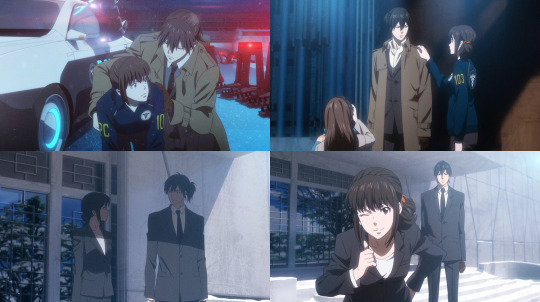
[Notice how Mika's body language changes from PP2 to Sinners of the System. She now looks at Ginoza with appreciation and, in certain instances, affection. The fact that he views her the same way speaks volumes about how far their relationship has come.]
If you made it to the end of this mammoth post, thank you for sticking with me. Hopefully, we can all treat Mika with a little more patience, kindness, and respect when PP4 arrives.
#psycho pass#psycho-pass#pp#shimotsuki mika#tsunemori akane#ginoza nobuchika#ginomika#ginoza x mika#anime#animanga#anime meta#women in anime#women in media#feminism#tsundere#my meta#text post#fandom discourse#did i really write a 4000 word essay defending an anime character?#you fucking bet i did#and i brought receipts
113 notes
·
View notes
Text
The number of people that completely villianize female characters is just another example of fandoms infantilizing male main characters. I understand protecting your favourites, but when you get to the point that you genuinely think they've never done anything wrong, you've put blinders on. It's almost always done towards female characters that the fandom feels have wronged male characters specifically. I get making jokes like, "Oh actually, my fav has never done anything wrong ever." I do it too. It can be funny. Nobody is saying you have to like a female character or you're a misogynist, but there is just such a clear, obvious pattern happening, and I don't think people even realize it. Male main characters will make the most toxic, horrible, stupid decisions, and the fandom with worship them, but the second a female character does something even remotely questionable, everybody goes off. It doesn't matter how kind or likable the woman is, the minute she does something the fandom sees as a slight against the male main character, she is shunned or ridiculed. I understand defending your favourite character because you love them, I really do, but the level that people infantilize them is just wild. A female character will have a perfectly understandable reaction to something the male main character did, and the fandom will still turn it around on her by saying things like, "Well he didn't know any better." Or, "Well, he was sad." Alright? Most humans, when they are hurt, do not turn around and kiss that person and coddle them. Getting upset, while it may not be the ideal reaction, is the most realistic one. And it's always grown ass men people are saying didn't know better than to do something obviously destructive. So they don't know better, and that's okay, but the female character struggles, and that's not? Obviously, I'm just talking about fiction, and doing this doesn't make you a bad person, and it doesn't mean you hate women. But it's just a clear pattern of misogyny in media that I think is important to recognize
#I feel like there are examples of this in just about every single show#im going to respond to this post separately to talk about the ones i am most familiar with#house md#housemd#fandom#female characters#women in media#feminist#feminism#womens rights#female main character#character analysis#TERFS DNI#terfs will be blocked
94 notes
·
View notes
Text
To all of the people who believe Azula is crazy/evil, and to all of those who think Eska is abusive or toxic. I just want to let you know from the bottom of my heart…that I actually could not care less.
(This isn’t a call out post and I’m not bashing on anyone I just need to say it)
I get it - Azula was a child and for that she is rightly granted leniency for the most part amongst the fandom. And Eska was definitely controlling but you can’t say she didn’t care
BUT HERES THE THING
I don’t care about the “excuses” or “reasons” like… at all. I am a firm believer in letting women be evil just for the sake of being evil.
Azula committed war crimes? Iconic
Eska told Bolin he shouldn’t touch other women? Literally queen behavior.
LET WOMEN BE EVIL, THEY DONT NEED DEFENDING. THEYRE TOXIC AND MORALLY CORRUPT AND ITS WHY I LOVE THEM
#team azula#Azula#avatar the last airbender#atla#lok#a:tlok#eska#boleska#toxic women#evil women#women in media#let women be evil#legend of korra
76 notes
·
View notes
Text
It’s not a fully fleshed out thought but I’ve grasped it now and so here’s what I’ve got dangling…
It’s so interesting to me that of the many issues and annoyances I have with Rory’s character her decisions around Yale are so tied to men.
Though the show we have a general sense that Rory (and by extension Loralai who raised her) have a distain or disappointment when women make choices due to men. Mainly when these choices are not mainly or solely things that a woman wants, and take another persons (usually a man’s) wants into account we see Rory scoff or roll her eyes or frown intensely and question it. When someone else makes a decision due to a man they want to like them or respect them, Rory seems to like and respect them less (at least in that moment).
But when a man, one who’s good opinion and respect SHE wants, says something hard and hurtful Rory abandons everything she (and by extension he mother) have worked for since she was a child. At the very least she gives up the main goal that’s dominated the last 3 years of her life. A man doesn’t think she’s good enough, so she gives up trying.
And though everyone tries to understand and support her, to change her mind and make her want to go back to Yale and to reignite her goals for her future, it is once again a man (who Rory wants to respect her and have a good opinion of her) who says a hard and hurtful thing which makes her go back to Yale.
And in the middle of all of that it’s another man (her grandfather) who has so much influence on her ‘choices’. Firstly in his support of her leaving, and in his 180 in the face of the reality of her life Rory’s grandfathers support plays a huge role in her confidence in her decisions and path.
I just find it fascinating that the writers chose to remove so much of Rory’s agency in these ‘choices’. They don’t write that Rory struggles at college, having reached the pinnacle she was working for and realising it isn’t as fulfilling as she had hoped; that she struggles (like she first did at Chiltern) now she is among other gifted people and she is once again less exceptional; that the courses she takes feel uninteresting and she languishes without drive or a purpose.
No they choose to write her story as a man says something mean and so she runs away.
And again, they don’t write her return to Yale as Rory being revitalised by her time away and once again motivated to aim higher; they don’t have her realise that she does thrive surrounded by other intellectuals and though it’s tough she CAN rise to the challenge like she did before; they don’t have her realise her dream career or degree is actually different than she thought so she goes back and changes major or her classes.
No once again, the writers have a man say something mean and so she runs away. Only this time she runs away back to where she was before.
So in the face of disappointment or dislike, at least from men she wants to like her, the only ‘choice’ Rory is allowed to make is to run.
#gilmore girls#rory gilmore#women in media#loralei gilmore#choices#personal agency#women’s agency#gah the whole Yale storyline annoys me so much
10 notes
·
View notes
Text
Cheum: Messy woman forced into the 'mom' role to rescue the men.
So like.. I dont like Cheum a lot, but this is not a hate rant on her and neither will I welcome hate against her. Anyway, I don't particularly enjoy her character mostly because almost her entire role is about the men. But after episode 8, I am even more icked by her. It's not because I'm some great Ray defender. I'm pissed off at him. But it's so weird how Cheum suddenly made everything about herself and 'friendships' because episode 8 suddenly tries to fit her into the 'mom friend' role. She's clearly getting the 'girls hold together and manage men' treatment when she's actually as messy as any of them. But women aren't allowed to be messy, are they? They are supposed to run around in parties looking after men who cannot handle their emotions, they're supposed to interfere in everything to keep things together.. It's frustrating to see women in shows being portrayed that way. Especially because that hasn't been Cheum's role till now. Sand is the mom friend, Mew is a more tamed version of the mom friend, heck even Top has entered the mom friend category after ep 8, some would call April a mom friend but that girl is too smart to mother anyone except her girlfriend; but not Cheum. She's more careless and drinks a lot and is bitchy and mean, and yet a wonderful girlfriend who has managed to make her relationship last for years (despite her hidden fuck ups). So like.. why cant the show just embrace her the way she is instead of trying to make her be something she's not? Maybe the show is going for character growth or maybe we're being shown her true character which she might have buried after years of things remaining unchanged in her friend group. But I wish the female characters didn't always have to be the sensible ones and I wish that the messy ones weren't suddenly given a turn around to clean up the messes made by others. I loved when she was bitching about April to the gang and when Ray and her had that fight at the bar and then when her and April made up because for once her entire role wasn't reduced to the male's drama. Maybe I'm just a super triggered girl who wanted a queer girl to be allowed to be messy and have her own drama rather than just be a mouthpiece to the men's drama 😥
#only friends the series#chuem only friends#cheum only friends#cheumapril#ofts cheum#ray only friends#sand only friends#mew only friends#top only friends#ofts#sandray#raysand#topmew#thai bl#thai drama#asianlgbtqdramas#character analysis#women in media#queer women in media#only friends
24 notes
·
View notes
Text
just watched "the beginning" part one and two episodes of the legend of korra, and I KID YOU NOT out of FOUR CITIES guarded by the lion turtles, I only saw ONE WOMAN and it was because the spirits were attacking the village and they had to get the shot of a woman cowering and clutching her child
wan refers to every new group of city-dwellers as "people" but there are no women spotted among them, no women spotted in the crowd of the poor rebels, in the first fire-benders or early air-benders picking fruit . . . but they are the people/humans
this season of the show was made in 2013
men are literally seen as default humans and i'm seeing it in so many children's shows . . . and looking back i can see how it affected me as a girl, and it breaks my heart
#women in media#representation in media#radfem#radblr#childhood shows#children's tv#atla#tlok#korra#the first avatar#avatar#nickelodeon
46 notes
·
View notes
Text
A rant about why Mei is my favorite “girl character”
Mei is definitely the kind of “girl character” I would have loved to see as a kid. Mainly cause girl isn’t her entire personality, She isn’t just the love interest to the main character, and it doesn’t feel like she was put in the show to be the “girl” of the group. And they did it without making her “not like other girls” which is something many writers (cough cough YA authors) struggle to do.
They also gave her a storyline (season 1 episode 3 Coming Home) that’s very relatable to girls like her who aren’t super fem. They explain in the episode that she feels like her parents want her to be something she’s not, a noble member of the dragon clan, and she’s never been allowed to “ruff and tumble” like the other kids because of expectations put on her to be prim and proper. The message in the end is that her parents still love her even if they don’t see eye to eye and that she can embrace her family history (and her womanhood) in her own way.
My parents were feminists who didn’t really push gender roles and yet throughout my childhood even I felt the pressure put on girls to be feminine. It was in my favorite shows where I felt I had 1-2 options for who I could see myself in even in a cast of 5-7. It was in the way I was told by adults to sit properly. It was even in the way I was dressed, the way other kids saw me. As I got older I felt as if my femininity, my girlhood, was some expectation I couldn’t meet rather than a part of me.
When Mei picks up the dragon sword and looks her ancestors in The eye she says “I am a descendent of the Great Dragon of the West Sea and no one gets to choose what that means for me but myself.” I feel like that is a wonderful message for young girl who has had there femininity questioned or who feels like they don’t meet the standards for girlhood.
Mei says you can be a girl however you want to be a girl and I love that.
#lmk#lego monkie kid#lmk mei#lmk long xiaojiao#long xiaojiao lmk#mei lmk#feminism#women in media#Girls#Being a dragon as a metaphor for being a women#Bet you’ve never heard that one before#Also I acknowledge that being a dragon is also a metaphor for living up to your culture#It can mean multiple things#I love Mei
12 notes
·
View notes
Text
one of the funniest things about fandom metas is you'll see someone going on a long rant about how the creator of a thing actively and intentionally tears down his own female characters and you'll be like "wow that's a good point yeah" and then halfway through you realize the person writing is somehow managing to blame the character for this
like. ok you can like or dislike whoever you want but i personally refuse to hate female characters just bc their authors do
#personal#vent post#feminism#women in media#misogyny in media#sexism#like how are you going to go on a whole rant about how an author treats his female characters#and then somehow interpret this as brilliant writing on his part but the character - who does not exist and has no real agency - is to blam#you don't have to like her but good g-d acknowledge the actual problem
13 notes
·
View notes
Text
culture is so full of male fantasies about beautiful flawless women being into mediocre men... mind it, female fantasy media doesn't quite replicate that. even like.. bella from twilight... she's beautiful, she just dares to be a bit clumsy and have flaws (any). she's not a mediocre looking shut in. meanwhile hot women in their 20s with model tier figures in fiction just are like "omg this 50 year old alcoholic with a weird face, scars, beer belly and severe intimacy issues is sooo bee's knees!". i just don't know how much of male delulu it is and how much of an accurate reflection of the average male-attracted woman's taste
8 notes
·
View notes
Text
Trying to write fiction about women who are detached intellectuals is challenging because
a. This is already a relatively rare trope for men
b. When men are portrayed this way they’re often a side character not the main
c. There are very few portrayals of women with this personality at all and almost none with a main character
d. Women with this personality fail so many standards of femininity that there aren’t even old archetypes or stories about them you can rely on
So far I’ve been practicing by writing male characters like this then gender swapping the words to refer to them, but this fails to touch on what it’s like to be a woman with these characteristics. Such a woman cannot help but notice how her gender holds her back, the prevalence of ancient misogyny, etc. As much as she may want to essentially be a gender swapped male, she isn’t. Writing that honestly requires imagination because existing media sure isn’t gonna help you.
If she’s gnc, forget it, you’re basically inventing it from scratch at that point. You never realize how much you rely on existing tropes as a writer until you come to a place where there are no older tropes to rely on!
#mypost#feminism#women in media#this post brought to you by staring at a blank page#how do you write a female genius?
36 notes
·
View notes